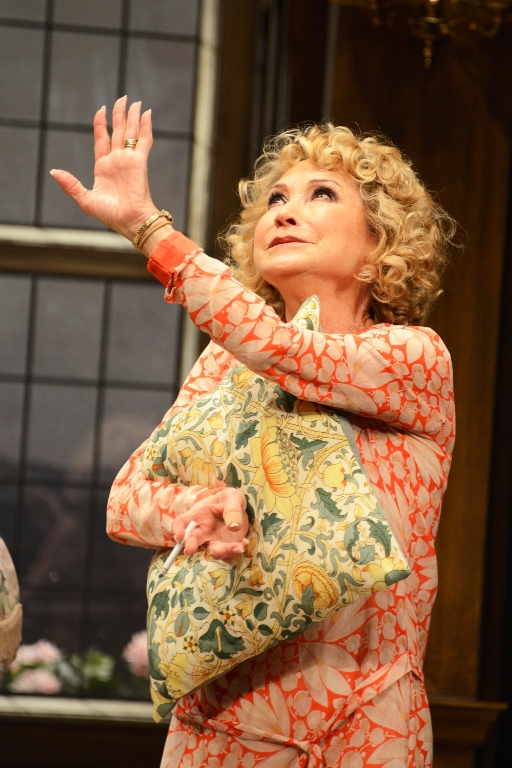"I sometimes wish we were more normal," sighs one of the adult Bliss children in Noel Coward’s country-house comedy. But it’s her family’s self-dramatising abnormality that provides both the froth and the substance of this early play, written in a blaze of youthful elan over three days in 1924. What has kept it a theatrical staple for 90 years and counting is not just its writer’s talent to amuse, nor its near-perfect structure: it is also the stain of truth that seeps through its merry mayhem, drawing on Coward’s own experience as a hapless weekend houseguest, and his sharp-eyed observations of how the new bohemian set behaved. Hay Fever is social satire, not just Downton with laughs.
But Lindsay Posner’s production, which started life last summer at Bath Theatre Royal, takes the softer option. No doubt it made sound commercial sense to cast Felicity Kendal as the ghastly Judith Bliss, a former stage actress who now fishes for compliments with the stamina of a trawlerman, but for all her famed comic timing Kendal (pictured below) brings neither pathos nor grandeur to the role. And her voice, now growly, now kittenishly laryngitic, at times alarmingly baritone, was already by opening night so hoarse that you wonder how it will survive the run.
 Kendal does, however, give a performance of great physical detail, with her manic hair-fluffing, energetic cigarette stubbing, and the generally panicked body language of a woman unwilling to give up the game, but aware that her daughter has overtaken her in sexual allure. When asked to act out the adverb “winsomely” in a doomed parlour game, she runs through a catalogue of pouts as if her life depended on it.
Kendal does, however, give a performance of great physical detail, with her manic hair-fluffing, energetic cigarette stubbing, and the generally panicked body language of a woman unwilling to give up the game, but aware that her daughter has overtaken her in sexual allure. When asked to act out the adverb “winsomely” in a doomed parlour game, she runs through a catalogue of pouts as if her life depended on it.
The supporting cast is mostly spot-on. Edward Franklin’s Simon and Alice Orr-Ewing’s Sorel squabble with the ferocity of true siblings and inhabit Peter McKintosh’s handsome set with the ease of its being their home, even if they do constantly fantasise about being somewhere more exotic than Cookham-on-Thames. Celeste Dodwell is also excellent as the ingénue invited by Simon Shepherd’s egocentric David Bliss to stay at the house “for research purposes” for the novel he’s writing. She’s way out of her depth in the wretched word-game, and smarts under her hosts’ undisguised disbelief that a guest should be unable to act with the required self-abandon.
Posner directs with a sure hand for pacing – the show bowls along at just two hours. But what an odd decision not to employ the accent actors know as “heightened RP”, the diphthong-curlicued vocal styling of every Englishman or woman above servant class in the 1920s. This entire cast (all but Mossie Smith’s trundling housekeeper) could be passholders at Henley Regatta in 2015. Yet expressions such as “how beastly!” surely demand a certain period sound to match.
Nonetheless Posner’s cast get full marks for diction in a difficult theatre acoustic, the stalls beset by a more than usually massive overhang. I was in a rotten seat and heard every word. Yet I’m pretty sure there were more laughs lying waiting in the script that more period voices could have unlocked. A pleasant evening, but this Hay Fever came without the streaming eyes.















Add comment